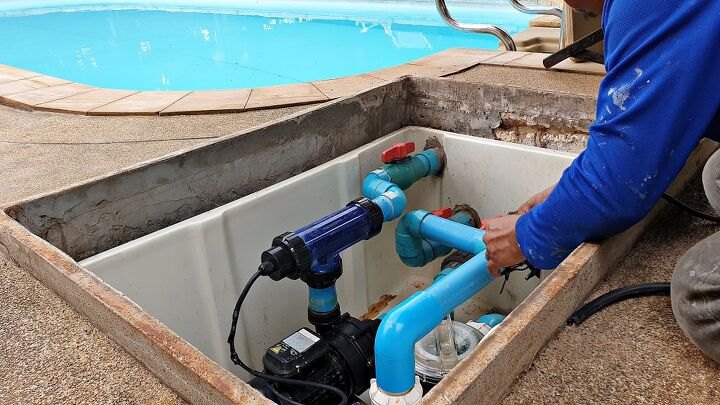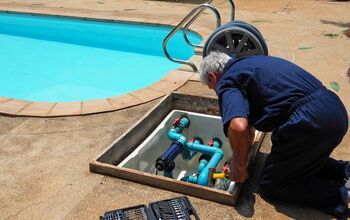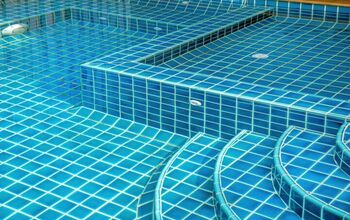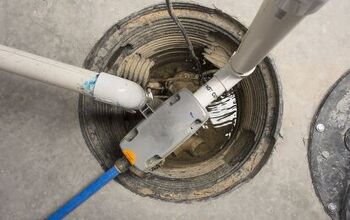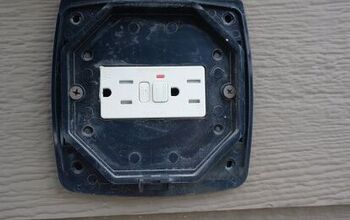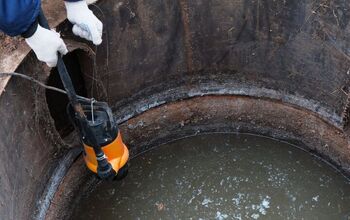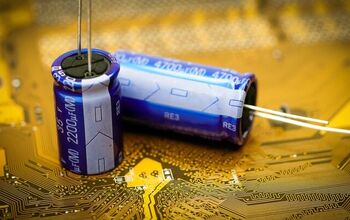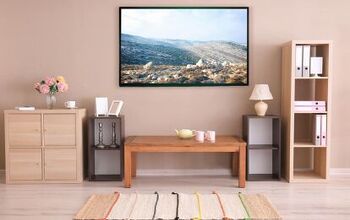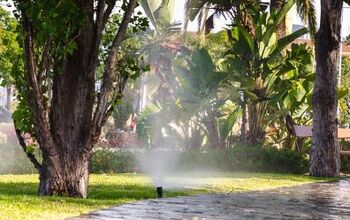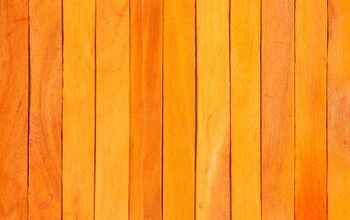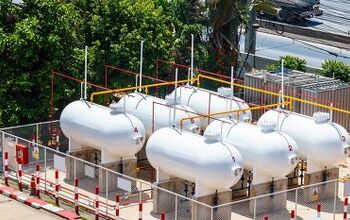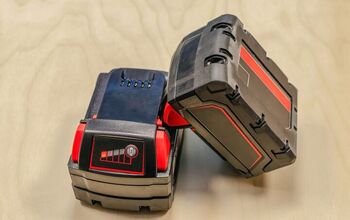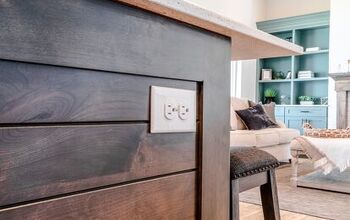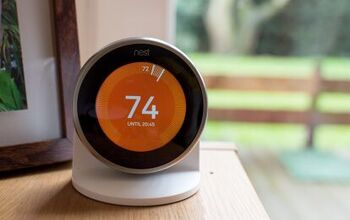My Pool Pump Is Loud! (Possible Causes & Fixes)

Ah, there’s nothing like a day in the pool. The sun is shining, the water is cool, the pool pump is making a loud buzzing noise…Wait. The pool pump isn’t supposed to sound like a loud motor having a temper tantrum. Pool pumps are supposed to be (kind of) quiet. When your pump is getting as loud as a nightclub on a hot day, you need to get to the bottom of whatever is causing it.
Pool pumps are going to be loud by default, with a typical pump reaching volumes as high as 95 decibels. Your pump should always make a low humming noise. Otherwise, you need to repair your pump. If you notice a loud gurgling noise, your pool pump is taking in too much air. An obstruction in the pump can cause a squeaking or sucking sound. Screeching pumps have bad bearings, while a “rock tumbler” noise suggests a bad impeller.
Getting your pump quiet can be a rough issue, but that’s not that bad. Our guide will help you get all the answers that you need.
Do You a Need Pool, Spa, or Hot Tub Contractor?
Get free, zero-commitment quotes from pro contractors near you.

Before You Begin: How Long Has Your Pool Pump Been Loud?
Before you assume something is wrong, be honest. Pool pumps are naturally going to be loud—like, think riding in a NYC subway loud. If your pump has always been loud but hummy, then it’s probably not going to get much quieter. On the other hand, if you’re noticing that the hum’s no longer sounding the same as it used to, it may be time to take a closer look at your pump.
Should You Be Worried?
Generally speaking, pool pumps are going to be one of the pricier repairs that you may have to make. However, most pool pumps last between 10 to 15 years. So while you should be somewhat concerned, you shouldn’t be too panicky unless you hear something alarming. Screeching, loud gurgling, or rocky noises would fit that bill.
With all that said, you should be aware that some pool pumps get noisier when they reach the end of their life cycle. So if you have a pump over the age of 12, then you probably should spring for a new one.
A Final Note Before We Troubleshoot Regarding Pool Pump Noise
Pool pump buzzing can be a fairly annoying issue, especially if you don’t have a housing that helps muffle the noise. If you get deeply bothered by standard pool pump noises, then you have one of two options: you can either install a quiet box around it or you can buy a quieter model.
It’s not unheard of to hear of noise complaints that come with a loud pool pump. If you find it hard to keep it quiet, you might want to take a look at some of the newer models on the market. Pool engineers have been working on a number of improvements that make it easier to have a silent pump.
Troubleshooting A Loud Pool Pump
Now that we’ve bypassed the big caveat of knowing whether or not your pump needs to be worked on, it’s time to figure out what is causing your pool pump.
Low Water Levels
Without a doubt, the most common issue that cause a loud pump is low water levels. Your pool water should be halfway to the skimmer’s door. If your water levels get too low, your pump is going to take in a bunch of air. This results in your pump sucking in air, often with a gurgling noise in tow.
A low water level needs to be addressed immediately, since too much air can cause obstructions in the pool and eventually cause pool pump failure. Add more water to your pool and manually prime your pump to see if it helps. If your pool pump was gurgling or buzzing extra loud, then this is what needed to be addressed.
Pump Housing Imbalance
Is your pump vibrating extra loud? Your pump is probably not on a level surface. Check the area where your pump is housed with a level. If it’s uneven, then your pump was extra loud because it was imbalanced. It’s a simple fix, too. All you have to do is level the platform that it’s housed on.
A Pump Blockage
Pool pumps are all about the suction action that they offer, and sometimes, stuff gets caught inside. This is a more difficult, multi-step troubleshooting issue. Here’s how to work it:
- Before you assume that the blockage is at your pump, check the skimmer first. Blockages in your skimmer basket can cause the same symptoms as a pump blockage. Remove any gobbledeegook in your skimmer basket to see if things clear up.
- Turn off your filter and unplug your pump. You don’t want to tinker around on a moving machine.
- Open up your pump basket and remove any gunk that you see there. This is a basic part of pump maintenance.
- Then, pull out your pump basket and put your hands down the tube. Try to feel for the rotating blades at the bottom, that’s the impeller.
- If the impeller is clogged or wobbly, then you have to fix it. A clogged impeller can be fixed by using a bent wire to scrape away the gunk around it. A loose impeller will need to be replaced or tightened professionally.
Cavitation
When too much air ends up in your pump, your pump will heat the water to a boil, then steam will start to rise up from all the machinery. This steam is super high temperature, and can be hot enough to melt the inner lining of your pump. Most of the time, the impeller will be the first thing to go. Other times, you might have serious pump body problems.
In most cases, cavitation will sound like a loud, shaky rattle. If this happens, you may need to get your impeller and interior lining replaced. Of course, that’s actually the best case scenario. If cavitation continues for too long, then you will need to replace the entirety of your pool pump.
Motor Issues
The final potential problem that you have is a problem with the motor. This is usually the “if all else fails” problem, especially if you hear sounds that sound alarming. Most of the time, the first thing to die in your motor is will be the bearing sets. When this happens, you’ll hear a loud shrieking or even screeching noise.
Unfortunately, when your pool pump motor starts to fail, there’s not much point in trying to fix it. Replacement is often cheaper in both the long and short term.
How Much Does It Cost To Fix A Pool Pump?
A pool pump that starts to make funky noises can vary greatly when it comes to the price of fixes. If you do it yourself, it could be free. Replacing an impeller can cost around $25 to $90 for the materials, plus one to two hours of labor. Pool techs tend to charge around $50 an hour.
Pool pump replacement can run between $500 to $1500, depending on the size of the pump. In rare cases, the price can reach higher. This is a good reason why you should do what you can to maintain your pool as best as you can. After all, if you avoid preventable issues (like blockages and cavitation), you’ll be sure to avoid repairs in the near future.
Do You a Need Pool, Spa, or Hot Tub Contractor?
Get free, zero-commitment quotes from pro contractors near you.

Related Questions
How loud should a typical pool pump be?
A standard pool pump will have a volume that is between 65 to 95 decibels. This means that a typical pool pump will be around the same volume as a loud blender up to the same volume as the subway. Getting a quiet-running pool pump is ideal, simply because your pump will be loud enough for the neighbors to hear. Investing in a quiet box for your pool pump can also help you reduce the noise of your pump.
How can you get your neighbor’s pool pump to quiet down?
There is no way for you to directly quiet down the neighbor’s pool pump. However, you can (politely) ask them to get a quiet box for it. If they are running it during your town’s quiet hours, you can also file a noise complaint if they refuse to listen to you. At the very worst, you may have to have a walk with your local HOA to see if they have any building codes regarding pool pumps and noise levels. HOAs are there to help with these kinds of things.
Can you run a pool pump for 24 hours straight?
In many cases, you actually may need to. This is often the case when you have a pool that is in dire need of cleaning, or if you noticed an uptick in pink slime around your pool area. With that said, you might want to invest in a pool pump quiet box to ensure that you don’t upset the neighbors with the nightly noise. It can be hard when you’re trying to sleep and hear that pump buzzing.

Ossiana Tepfenhart is an expert writer, focusing on interior design and general home tips. Writing is her life, and it's what she does best. Her interests include art and real estate investments.
More by Ossiana Tepfenhart



